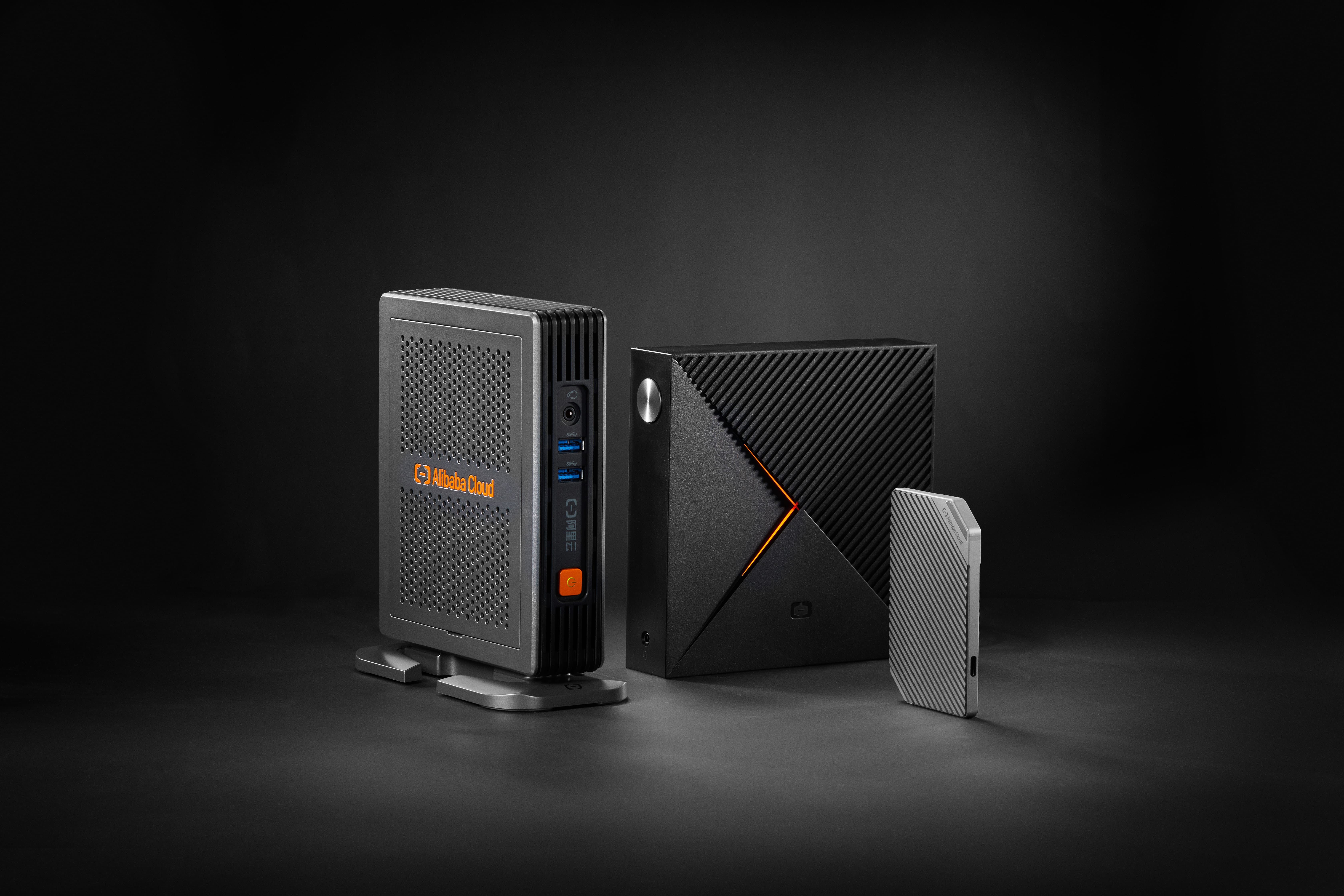
Alibaba Cloud's new cloud-based computers, now available for users in Singapore. Photo credit: Alibaba Group
This week, Alibaba Group’s cloud computing arm made big news by going small as its pocket-sized cloud-connected computers hit the Singapore market. Haven’t got pockets? Don’t worry. A desktop-sized version is also available.
In other news, e-commerce capabilities are now a make-or-break requirement for business-to-business (B2B) players, according to an Alibaba.com’s report released during the platform’s annual March Expo.
Saving the best for last, arithmetic admirers, exponent enthusiasts, and division devotees rejoiced this week as the Alibaba Global Mathematics Competition applications opened.
Honey, Someone Shrunk the Cloud Computer!
Imagine the power of the cloud, available in the palm of your hand. Alibaba Cloud made this possible for Singaporean users this week by launching its petite Wuying Cloud Computer and the desktop-sized Elastic Desktop Service (EDS).
The computers bring Singaporean businesses and their workforces Desktop-as-a-Service (DaaS) for easier IT deployment, enhanced security and greater working flexibility as Alibaba Cloud manages setup, maintenance, storage and connectivity.
Professionals working outside the office will be able to run heavy computer-powered productivity applications on these cost-effective devices, from building oil simulations and medical research to video rendering and financial modeling.
“We have seen customers using our cloud computing and reducing their IT hardware spending by almost 50%, resulting in a significant boost to their productivity levels,” said Dr. Derek Wang, General Manager for Singapore, Alibaba Cloud Intelligence.
One of the early adopters of Alibaba Cloud’s cloud computer in Singapore is one-stop IT and communication service provider Netpluz Asia.
The company’s employees use Alibaba’s cloud computers to access corporate applications through a web browser, helping them to scale faster while cutting capital expenditure.
E-Commerce Vital for B2B Players, Alibaba.com Report Finds
The B2B sector will rely more heavily on e-commerce channels as the pandemic disrupts supply chains and restricts cross-border travel, according to a joint report published this week by Alibaba B2B marketplace Alibaba.com and research firm Euromonitor International.
The volume of business taking place online will reach 32.6% of total transactions in Germany, 25.3% in Spain, 16.4% in Italy and 16.8% in Turkey by 2026, according to Euromonitor data.
“We are moving towards a hybrid mode, where physical and virtual complement each other,” said Luca Curtarelli, country manager of Alibaba.com Italy, Spain and Portugal.
Sellers and buyers want accessible communication channels, improved visibility to reach potential customers and a simple back-end system with customized services for business acceleration.
On Alibaba.com, 150 million registered users and over 26 million buyers in more than 190 countries have found a place to do business that meets these requirements.
“We went the extra mile by creating digital trade shows and activities that helped brands get as many tools as possible to sell, and buyers to buy,” said Curtarelli.
To help buyers and sellers connect and make better sourcing decisions, Alibaba.com is hosting its annual Expo from March 1 to March 31.
The number of sellers able to livestream increased by 60% compared to last September’s online trade show’s data, while time spent watching short videos increased by 20%.
Alibaba Global Mathematics Competition Opens For Applications
The 2022 edition of the annual Alibaba Global Mathematics Competition is open for business, and subject enthusiasts can register from this week until late April on the Damo Academy website.
Accepted entrants will go through two rounds of preliminaries before reaching the two finals, all conducted online. In the spirit of the competition’s motto – “everyone can ask questions, and everyone can answer questions” – the questions were sourced from the public.
Alibaba has received more than 145 questions from people as young as 14 and as old as 83 living in China, France, South Africa, Malaysia and beyond. Entries are screened, revised, tested and verified by a group of professional mathematicians.
This year, after at least four rounds of polishing, the team selected two questions for the preliminaries and another two questions for the final round.
The competition is now in its fourth year. There are no entry requirements, and in the past iterations of the event, roughly 150,000 people from 70 countries participated.
Cainiao Taps Rooftop Solar Panels to Power Bonded Warehouses
Alibaba logistics arm Cainiao Network has started to use energy generated by rooftop solar panels installed on its bonded warehouses in China to power the operations within.
The two warehouses, located in Hangzhou and Ningbo in eastern China’s Zhejiang Province, are the first to adopt renewable energy sources within the bonded zones in China, the platform said in a statement on Thursday.
“The successful launch of Cainiao’s first warehouse zone with a photovoltaic (PV) power generation system is just the beginning of the sustainable measures that we have planned,” said Sun Beibei, General Manager of Global Supply Chain at Cainiao.
The move comes as the logistics business spearheads a campaign to build up a global green supply chain.
Chinese e-commerce companies were responsible for 53.3 million tonnes of carbon emissions in 2019, according to a report from Energy Foundation. This is equivalent to what 10 billion trees can offset in a year, among which logistics accounts for 29%, while warehousing takes up 4%.
Read more here




